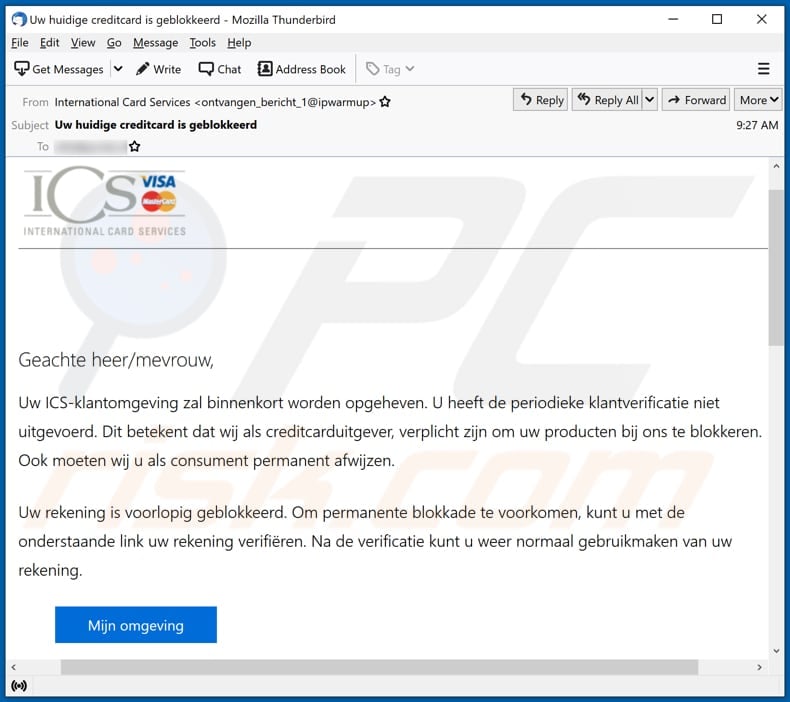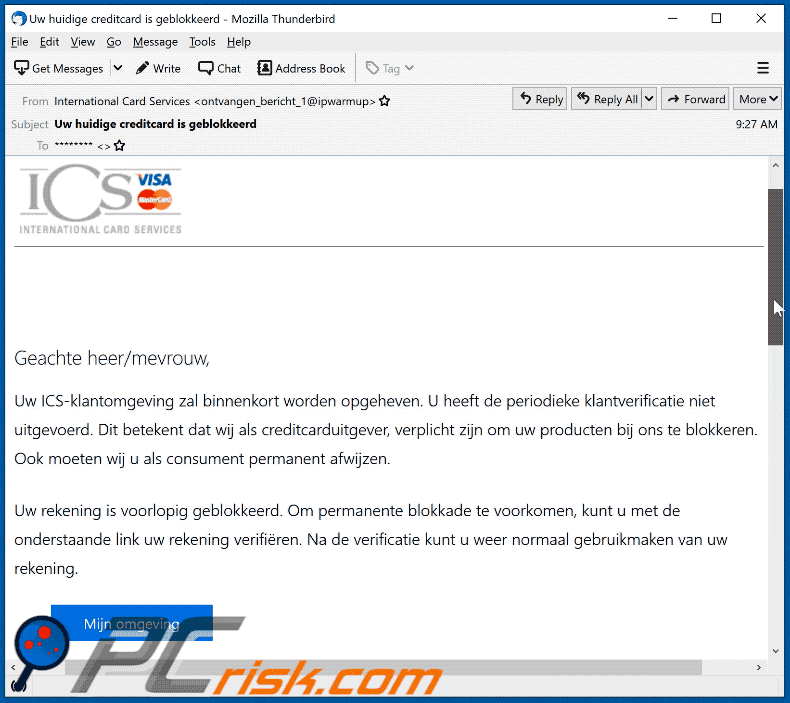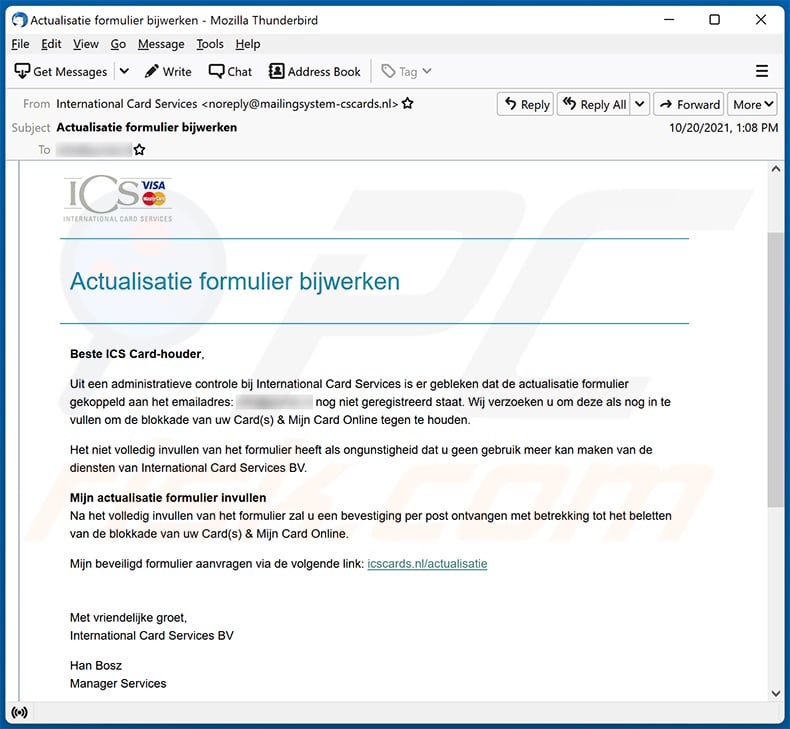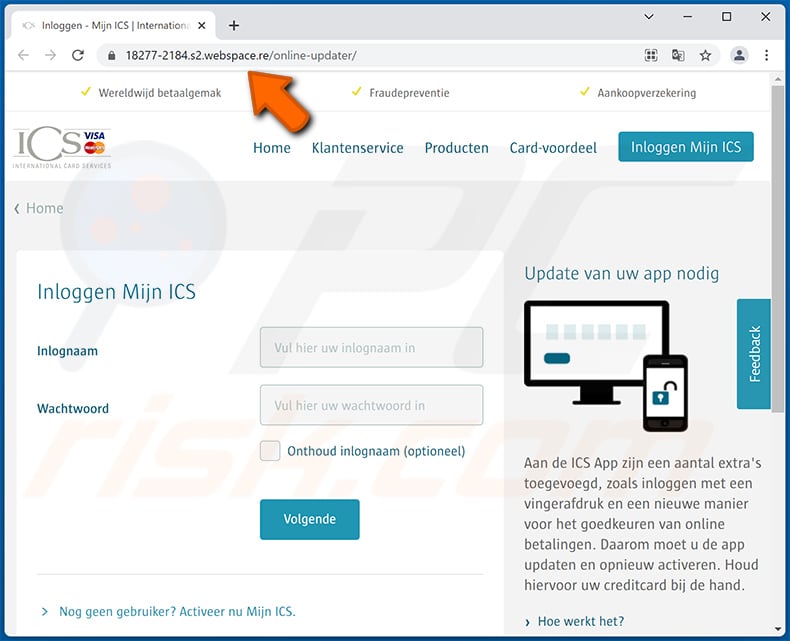How to recognize phishing emails like ICS (International Card Services)?
Phishing/ScamAlso Known As: ICS (International Card Services) spam
Get free scan and check if your device is infected.
Remove it nowTo use full-featured product, you have to purchase a license for Combo Cleaner. Seven days free trial available. Combo Cleaner is owned and operated by RCS LT, the parent company of PCRisk.com.
What is ICS (International Card Services) email scam?
Scammers behind phishing emails try to trick recipients into providing credit card details, usernames, passwords, social security numbers, or other personal information. This phishing email is likely to be used to extract credit card details and (or) online banking information.

More about the ICS (International Card Services) email scam
This email is disguised as a letter from a company called International Card Services. Scammers attempt to trick recipients into believing that their bank account will be blocked because they have not performed a periodic customer verification.
Scammers claim that recipients can avoid having their bank account blocked by verifying their account via the provided website. At the time of the research, that website link was not working. Although, it may be fixed and used to trick recipients into providing online banking credentials, credit card details, or other sensitive information.
| Name | ICS (International Card Services) Email Scam |
| Threat Type | Phishing, Scam, Social Engineering, Fraud |
| Fake Claim | Bank account has been blocked |
| Disguise | Letter from a Dutch company called ICS |
| Symptoms | Unauthorized online purchases, changed online account passwords, identity theft, illegal access of the computer. |
| Distribution methods | Deceptive emails, rogue online pop-up ads, search engine poisoning techniques, misspelled domains. |
| Damage | Loss of sensitive private information, monetary loss, identity theft. |
| Malware Removal (Windows) |
To eliminate possible malware infections, scan your computer with legitimate antivirus software. Our security researchers recommend using Combo Cleaner. Download Combo CleanerTo use full-featured product, you have to purchase a license for Combo Cleaner. 7 days free trial available. Combo Cleaner is owned and operated by RCS LT, the parent company of PCRisk.com. |
Conclusion
Scammers use this email to trick recipients into providing information that could be used to make fraudulent transactions, steal identities, or for other malicious purposes. More examples of similar phishing emails are "HSBC E-Payment Advice", "DBS Bank", and "Banca Sella". Cybercriminals can use emails to deliver malware as well.
How do spam campaigns infect computers?
Emails that cybercriminals use to distribute malware contain malicious attachments or website links. Recipients infect computers by downloading and opening a malicious MS Office, PDF documents, executable files, JavaScript, or other files. Typically, files in emails of this type are presented as important, official documents.
Malicious documents opened with MS Office 2010 and newer versions ask for permission to enable macros commands (editing/content). They do not install malware unless users enable macros commands in them. Older MS Office versions do not have the "Protected View" mode. Thus, malicious documents opened with them infect computers automatically.
How to avoid installation of malware?
Irrelevant emails with website links or attachments in them should not be trusted, especially when they are sent from suspicious addresses. Programs (and files) should be downloaded only from legitimate, reliable sources such as official websites and via direct links.
Installed software has to be updated or activated using tools or functions that its official developers provide. The operating system should have a reputable antivirus or anti-spyware software installed on it. It is recommended to scan the system for malware on a regular basis.
If you've already opened malicious attachments, we recommend running a scan with Combo Cleaner Antivirus for Windows to automatically eliminate infiltrated malware.
Appearance of the ICS (International Card Services) email scam (GIF):

Text in this email (written in Dutch and English languages):
Subject: Uw huidige creditcard is geblokkeerd
ICS
INTERNATIONAL CARD SERVICES
Belangrijke informatie met betrekking tot uw bestelling bij Microsoft
Geachte heer/mevrouw,Uw ICS-klantomgeving zal binnenkort worden opgeheven. U heeft de periodieke klantverificatie niet uitgevoerd. Dit betekent dat wij als creditcarduitgever, verplicht zijn om uw producten bij ons te blokkeren. Ook moeten wij u als consument permanent afwijzen.
Uw rekening is voorlopig geblokkeerd. Om permanente blokkade te voorkomen, kunt u met de onderstaande link uw rekening verifiëren. Na de verificatie kunt u weer normaal gebruikmaken van uw rekening.
Mijn omgeving
Wij wensen u alvast veel betaalgemak!
Met vriendelijke groet,
International Card Services BV
Uw Card wordt uitgegeven door International Card Services BV (ICS).Let op! Ga voorzichtig om met uw persoonlijke gegevens. Medewerkers van ICS zullen nooit naar uw gebruikersnaam, wachtwoord en/of pincode vragen. Niet via e-mail, telefoon of op welke andere manier dan ook.
Dit bericht is verzonden door International Card Services BV, gevestigd aan de Wisselwerking 32 te (1112 XP) Diemen, ingeschreven in het Handelsregister Amsterdam onder nummer 33.200.596.
This message has been sent by International Card Services BV, which has its seat at Wisselwerking 32 (1112 XP) Diemen, the Netherlands, and is registered in the Commercial Register of Amsterdam under number 33.200.596.
A Dutch variant of ICS (International Card Services)-themed spam email promoting a phishing site:

Text presented within:
Subject: Actualisatie formulier bijwerken
INTERNATIONAL CARD SERVICESActualisatie formulier bijwerken
Beste ICS Card-houder,
Uit een administratieve controle bij International Card Services is er gebleken dat de actualisatie formulier gekoppeld aan het emailadres: - nog niet geregistreerd staat. Wij verzoeken u om deze als nog in te vullen om de blokkade van uw Card(s) & Mijn Card Online tegen te houden.
Het niet volledig invullen van het formulier heeft als ongunstigheid dat u geen gebruik meer kan maken van de diensten van International Card Services BV.
Mijn actualisatie formulier invullen
Na het volledig invullen van het formulier zal u een bevestiging per post ontvangen met betrekking tot het beletten van de blokkade van uw Card(s) & Mijn Card Online.Mijn beveiligd formulier aanvragen via de volgende link: icscards.nl/actualisatie
Met vriendelijke groet,
International Card Services BVHan Bosz
Manager Services
De ABN AMRO Credit Card wordt uitgegeven door International Card Services BV (ICS).Let op! Ga voorzichtig om met uw persoonlijke gegevens. Medewerkers van ICS zullen nooit naar uw gebruikersnaam, wachtwoord en/of pincode vragen. Niet via e-mail, telefoon of op welke andere manier dan ook.
Wilt u niet langer door ICS op de hoogte gehouden worden van aanbiedingen of vernieuwingen van uw ABN AMRO creditcard(s)? Dan kunt u zich hier afmelden.
Dit bericht is verzonden door International Card Services BV, gevestigd aan de Wisselwerking 32 te (1112 XP) Diemen, ingeschreven in het Handelsregister Amsterdam onder nummer 33.200.596.
Screenshot of the promoted phishing site (fake ICS website):

Instant automatic malware removal:
Manual threat removal might be a lengthy and complicated process that requires advanced IT skills. Combo Cleaner is a professional automatic malware removal tool that is recommended to get rid of malware. Download it by clicking the button below:
DOWNLOAD Combo CleanerBy downloading any software listed on this website you agree to our Privacy Policy and Terms of Use. To use full-featured product, you have to purchase a license for Combo Cleaner. 7 days free trial available. Combo Cleaner is owned and operated by RCS LT, the parent company of PCRisk.com.
Quick menu:
- What is ICS (International Card Services) spam?
- Types of malicious emails.
- How to spot a malicious email?
- What to do if you fell for an email scam?
Types of malicious emails:
![]() Phishing Emails
Phishing Emails
Most commonly, cybercriminals use deceptive emails to trick Internet users into giving away their sensitive private information, for example, login information for various online services, email accounts, or online banking information.
Such attacks are called phishing. In a phishing attack, cybercriminals usually send an email message with some popular service logo (for example, Microsoft, DHL, Amazon, Netflix), create urgency (wrong shipping address, expired password, etc.), and place a link which they hope their potential victims will click on.
After clicking the link presented in such email message, victims are redirected to a fake website that looks identical or extremely similar to the original one. Victims are then asked to enter their password, credit card details, or some other information that gets stolen by cybercriminals.
![]() Emails with Malicious Attachments
Emails with Malicious Attachments
Another popular attack vector is email spam with malicious attachments that infect users' computers with malware. Malicious attachments usually carry trojans that are capable of stealing passwords, banking information, and other sensitive information.
In such attacks, cybercriminals' main goal is to trick their potential victims into opening an infected email attachment. To achieve this goal, email messages usually talk about recently received invoices, faxes, or voice messages.
If a potential victim falls for the lure and opens the attachment, their computers get infected, and cybercriminals can collect a lot of sensitive information.
While it's a more complicated method to steal personal information (spam filters and antivirus programs usually detect such attempts), if successful, cybercriminals can get a much wider array of data and can collect information for a long period of time.
![]() Sextortion Emails
Sextortion Emails
This is a type of phishing. In this case, users receive an email claiming that a cybercriminal could access the webcam of the potential victim and has a video recording of one's masturbation.
To get rid of the video, victims are asked to pay a ransom (usually using Bitcoin or another cryptocurrency). Nevertheless, all of these claims are false - users who receive such emails should ignore and delete them.
How to spot a malicious email?
While cyber criminals try to make their lure emails look trustworthy, here are some things that you should look for when trying to spot a phishing email:
- Check the sender's ("from") email address: Hover your mouse over the "from" address and check if it's legitimate. For example, if you received an email from Microsoft, be sure to check if the email address is @microsoft.com and not something suspicious like @m1crosoft.com, @microsfot.com, @account-security-noreply.com, etc.
- Check for generic greetings: If the greeting in the email is "Dear user", "Dear @youremail.com", "Dear valued customer", this should raise suspiciousness. Most commonly, companies call you by your name. Lack of this information could signal a phishing attempt.
- Check the links in the email: Hover your mouse over the link presented in the email, if the link that appears seems suspicious, don't click it. For example, if you received an email from Microsoft and the link in the email shows that it will go to firebasestorage.googleapis.com/v0... you shouldn't trust it. It's best not to click any links in the emails but to visit the company website that sent you the email in the first place.
- Don't blindly trust email attachments: Most commonly, legitimate companies will ask you to log in to their website and to view any documents there; if you received an email with an attachment, it's a good idea to scan it with an antivirus application. Infected email attachments are a common attack vector used by cybercriminals.
To minimise the risk of opening phishing and malicious emails we recommend using Combo Cleaner Antivirus for Windows.
Example of a spam email:

What to do if you fell for an email scam?
- If you clicked on a link in a phishing email and entered your password - be sure to change your password as soon as possible. Usually, cybercriminals collect stolen credentials and then sell them to other groups that use them for malicious purposes. If you change your password in a timely manner, there's a chance that criminals won't have enough time to do any damage.
- If you entered your credit card information - contact your bank as soon as possible and explain the situation. There's a good chance that you will need to cancel your compromised credit card and get a new one.
- If you see any signs of identity theft - you should immediately contact the Federal Trade Commission. This institution will collect information about your situation and create a personal recovery plan.
- If you opened a malicious attachment - your computer is probably infected, you should scan it with a reputable antivirus application. For this purpose, we recommend using Combo Cleaner Antivirus for Windows.
- Help other Internet users - report phishing emails to Anti-Phishing Working Group, FBI’s Internet Crime Complaint Center, National Fraud Information Center and U.S. Department of Justice.
Frequently Asked Questions (FAQ)
Why did I receive this email?
Criminals dispatch identical letters to thousands of individuals, aiming for someone to be deceived. These unsolicited emails lack personalization.
I have provided my personal information when tricked by this email, what should I do?
If you have shared any account credentials, promptly update all passwords. In case you have disclosed other sensitive information, such as credit card details or ID card information, reach out to the relevant authorities at your earliest convenience.
I have downloaded and opened a file attached to an email, is my computer infected?
The likelihood of infection varies based on the type of opened file. Executable files can infect operating systems upon opening, while malicious document files typically necessitate additional user interaction for the infection to occur.
I have sent cryptocurrency to the address presented in such email, can I get my money back?
Tracing or recovering funds in cryptocurrency transactions is problematic because of their untraceable nature. Once initiated, these transactions are generally irreversible.
I have read the email but didn't open the attachment, is my computer infected?
Simply opening an email is usually not a reason for concern. The risk escalates when individuals actively interact with the email, such as clicking on links or opening attached files. These actions can potentially result in system infections and pose security threats.
Will Combo Cleaner remove malware infections that were present in email attachment?
Combo Cleaner proficiently detects and eradicates various known malware infections. It is essential to note that advanced malware might conceal itself deeply within the system. As a result, conducting a thorough system scan is imperative to ensure the removal of potential threats.
Share:

Tomas Meskauskas
Expert security researcher, professional malware analyst
I am passionate about computer security and technology. I have an experience of over 10 years working in various companies related to computer technical issue solving and Internet security. I have been working as an author and editor for pcrisk.com since 2010. Follow me on Twitter and LinkedIn to stay informed about the latest online security threats.
PCrisk security portal is brought by a company RCS LT.
Joined forces of security researchers help educate computer users about the latest online security threats. More information about the company RCS LT.
Our malware removal guides are free. However, if you want to support us you can send us a donation.
DonatePCrisk security portal is brought by a company RCS LT.
Joined forces of security researchers help educate computer users about the latest online security threats. More information about the company RCS LT.
Our malware removal guides are free. However, if you want to support us you can send us a donation.
Donate
▼ Show Discussion